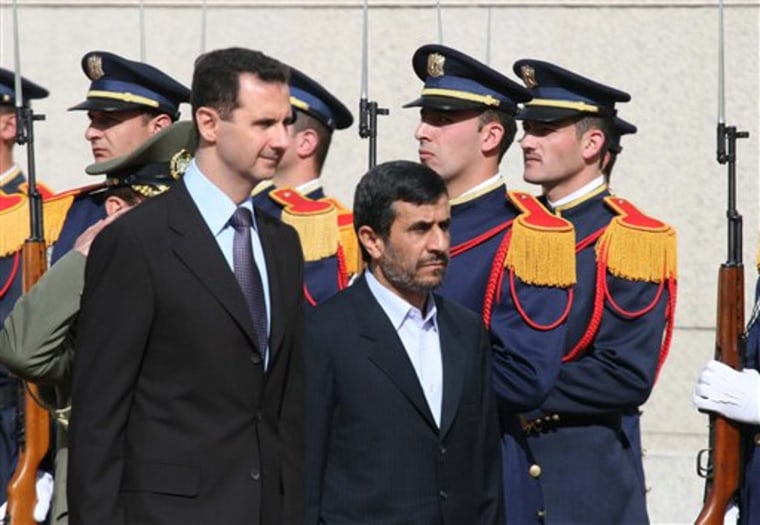Syrian President Bashar Assad defied U.S. calls to loosen ties with Iran on Thursday, saying his long-standing alliance with Tehran remains strong despite overtures from Washington intended to shift his loyalties.
The U.S. has reached out to Syria in recent months by nominating the first U.S. ambassador to Damascus since 2005 and sending top diplomats to meet with President Bashar Assad. Washington is hoping to draw Syria away from Iran and the militant groups Hezbollah and Hamas.
But with Iranian President Mahmoud Ahmadinejad by his side in Damascus, Assad said Thursday that America should not dictate relationships in the Middle East.
"I find it strange how they talk about Middle East stability and at the same time talk about dividing two countries," Assad told reporters when asked about Secretary of State Hillary Rodham Clinton's call Wednesday for Syria to move away from Iran.
Assad took a swipe at Clinton for making such a suggestion, saying he and Ahmadinejad "misunderstood, maybe because of translation error or limited understanding." In a show of unity, the two signed an agreement canceling travel visas between the their countries.
President Barack Obama is determined to engage with Syria, a country seen as key to peace in the region but which the State Department considers a sponsor of terrorism.
Former President George W. Bush withdrew the last U.S. ambassador to Syria in 2005 after the assassination of former Lebanese Prime Minister Rafik Hariri, which his supporters blamed on Syria. Syria denies any links.
Despite Assad's strong words Thursday, he could be open to a breakthrough with America.
'A new situation'
Assad has begun to dismantle his father's socialist legacy since he rose to office in 2000. He has loosened the reins on banking, sought to attract foreign investment, and encouraged tourism and private education.
Assad is hoping for U.S. help in boosting the Syrian economy and American mediation in direct peace talks with Israel — a recognition that he needs U.S. help to reach his goal of winning the return of the Golan Heights, seized by Israel in the 1967 Mideast war.
But Clinton said Wednesday that the recent decision to send an ambassador to Syria did not mean American concerns about the country have been addressed.
Speaking to lawmakers in Washington, Clinton said the nomination of career diplomat Robert Ford signaled a "slight opening" with Syria. But she said Washington remained troubled by suspected Syrian support for militant groups in Iraq and elsewhere, interference in Lebanon and Syria's close relationship with Iran.
Ahmadinejad's trip comes amid rising U.S. tension with Iran over its nuclear program. The U.S. and others believe Iran is hiding nuclear weapons development under the guise of a civilian energy program. Iran insist its intentions are peaceful.
Assad called America's stance toward Iran "a new situation of colonialism in the region."
Despite its efforts to woo Syria, Washington has not lifted sanctions on Damascus. First imposed by Bush and renewed by Obama in May, the sanctions cite Syria's support for terrorism, its pursuit of weapons of mass destruction and other activities including efforts to undermine U.S. operations in Iraq.
'Brotherly relations'
Iran's economic and political support has enabled Syria to survive those sanctions and international isolation.
Ahmadinejad stressed that Syria and Iran are partners with a long history.
"There is nothing that could harm these brotherly relations," he said. "With each passing day, these relations will improve and deepen."
Sarkis Naoum, political editor of the Beirut daily An-Nahar, who follows Iran-Syria relations, says he does not see the countries severing ties anytime soon.
"Syria was supported by Iran, Iran helped Syria maintain its regime," he said. "Mr. Obama's engagement policy has not worked yet."
